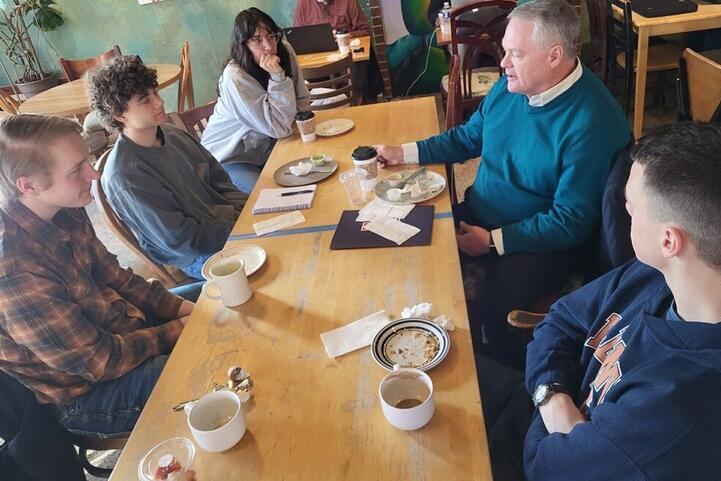Renowned international economist Chris Barrett visits Illinois for lecture and discussions

Emphasizing the need for interdisciplinary teams to provide “bundles” of services to solve major development challenges around the world, international economist Chris Barrett spoke to several groups at the University of Illinois as part of his visit to the Center for Advanced Study MillerComm lecture series, hosted by the Department of Agricultural and Consumer Economics (ACE) and co-sponsored by over 30 units on campus including the Office of International Programs and the Office of Research in the College of Agricultural, Consumer and Environmental Sciences (ACES).
Barrett is the Stephen B. and Janice G. Ashley Professor of Applied Economics and Management at Cornell University. He is well known globally in the fields of agricultural economics, development economics, food security, poverty, and resource economics.
Navigating a packed schedule, Barrett met with Illinois undergraduate and graduate students; faculty who are also experts in food supply chains, entomology, and international development; and ACES department heads.
“Four of our undergraduate students had a unique opportunity to share their experiences and get feedback on their future plans from someone whose work actively addresses the global challenge of food insecurity. Chris told me how impressed he was with our ACES students; I was too,” said Lauren Karplus, assistant director for ACES International Programs.
Quentin Herzig, a senior in Crop Sciences who is an ACES Global Food Security Intern and aspiring molecular biologist, felt especially optimistic after hearing about Barrett's innovative approaches.
“To many of us it feels like global issues stem from powerful individuals and corporations acting in self-interest rather than in the collective interest of humanity and our home. Dr. Barrett proposes to work in harmony with corporate self-interest by proposing the implementation of ‘Benevolent Patent Extensions’ that create incentive for corporations to do public good. He also stresses the importance of strategically pitching and deploying food security technology through ‘Socio-Technical Innovation Bundles.' Understanding social impacts of biotechnologies or other scientific innovations is a crucial and often overlooked aspect of food security innovation and an aspect I want to prioritize in my future work,” said Herzig.
During an inspirational talk aimed at graduate students and early-career faculty in the Departments of ACE and Economics, Barrett reflected on his years as an applied economist. He encouraged audience members to think deeply about their motivations for pursuing higher education in applied economics, and ways to maximize their impact.
The visit was capped off by Barrett’s standing-room-only, informational lecture “Developing the Food System We Urgently Need: Healthy, Equitable, Resilient, and Sustainable.” Audience members then attended a reception that was funded by the ACES Office of Research and the Office of International Programs.
Barrett’s visit, facilitated by the MillerComm lecture series, was initiated by Agricultural and Consumer Economics Professors Hope Michelson and Sarah Janzen.